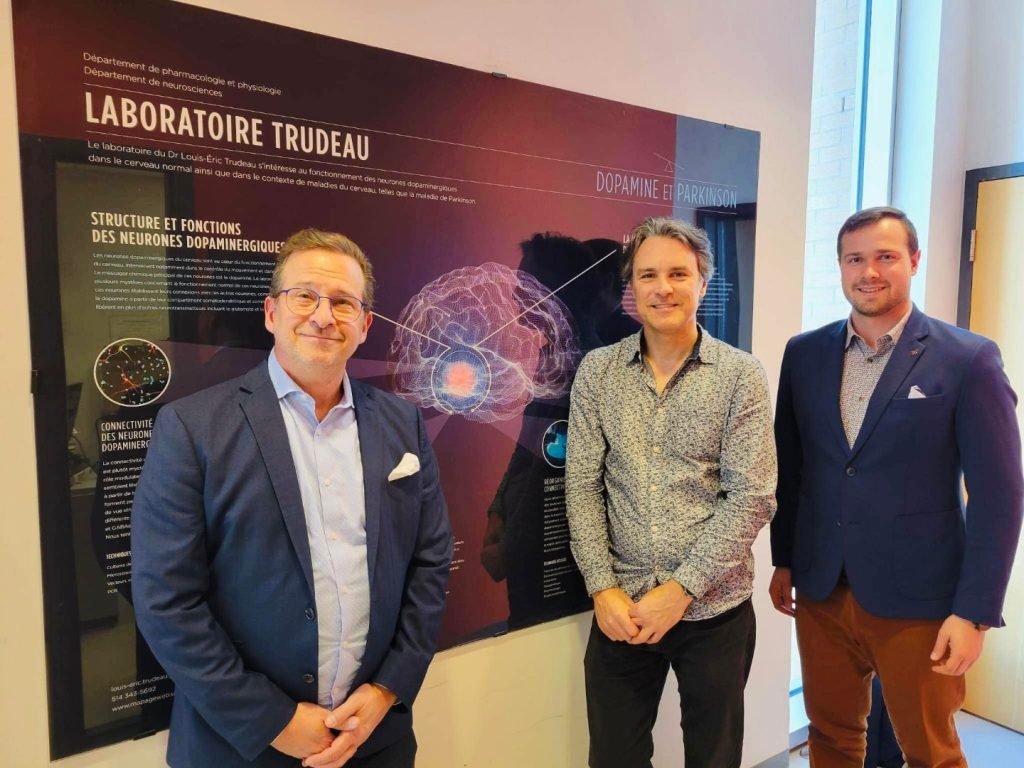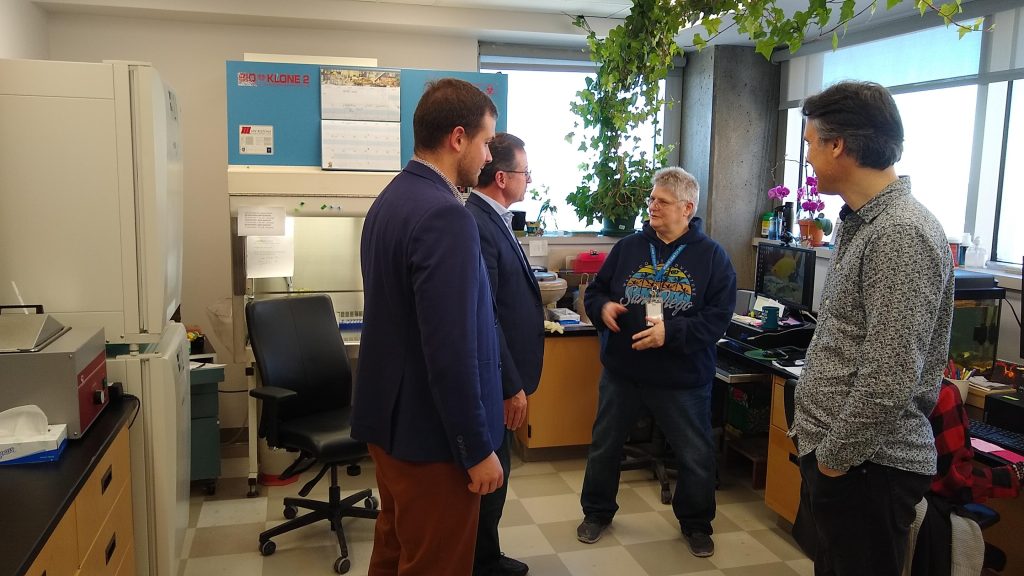The Faculty of Health Sciences (FHS) at Queen’s University invites applications from exceptional scholars performing research on non-human primate (NHP) models of health and disease. This appointment is open only to qualified individuals who self-identify as members of one or more of the Four Designated Groups under the Canada Research Chair program (view note 1) : women, Indigenous/Aboriginal peoples, persons with disabilities and racialized persons/visible minorities.
The successful candidate will be appointed at the rank of Assistant Professor (tenure-track) or Associate Professor (tenured), depending upon level of experience, in the Department of Biomedical and Molecular Sciences with an anticipated start date of September 1, 2023. They will be expected to submit an external nomination for a five-year term position as a Tier 2 Canada Research Chair (CRC), eligible for renewal once, to a maximum of two five-year terms as a Tier 2 CRC in NHP models of Health and Disease.
The incumbent will hold an advanced degree (i.e., PhD or MD or MD/PhD) and post-doctoral training to position them as an emerging leader in the field using NHP Models of Health and Disease. They will have a distinguished innovative record of accomplishment and possess expertise in innovative experimental approaches using NHPs to understand healthy sensorimotor and/or cognitive functions, and/or develop models of disease. They will establish an innovative, independent research program and will be expected to secure external funding from diverse sources, including national agencies such as the Natural Science and Engineering Research Council of Canada, and Canadian Institutes of Health Research. They will supervise, mentor, and train students and other highly qualified personnel.
Our top priority is to provide opportunities for emerging scholars to develop an internationally recognized research profile within a dynamic environment wherein all faculty can thrive. A key criterion is to enhance existing strengths at Queen’s University in systems neuroscience that explore NHPs to study neural circuits supporting sensory, motor and cognitive processes and models of neurological diseases/injury. Queen’s boasts a large, modern non-human primate research facility including over a dozen behavioural assessment labs, surgical suites, and an adjacent and easily-accessible MRI facility that houses a state-of-the-art Siemens Prisma system.
Prior to May 1, 2022, the University required all students, faculty, staff, and visitors (including contractors) to declare their COVID-19 vaccination status and provide proof that they were fully vaccinated or had an approved accommodation to engage in in-person University activities. These requirements were suspended effective May 1, 2022, but the University may reinstate them at any point.
Canada Research Chairs were established as part of a national strategy to foster research excellence (www.chairs-chaires.gc.ca). The successful candidate must submit an external application to the Tri-agency Institutional Program Secretariat that meets the requirements for the successful nomination of Tier 2 Chair as defined by the Canada Research Chairs Program:
- be an excellent emerging world-class researcher who has demonstrated particular research creativity;
- have demonstrated the potential to achieve international recognition in their field in the next five to ten years;
- have the potential to attract, develop and retain excellent trainees, students and future researchers; and
- be proposing an original, innovative research program of high
Candidates more than 10 years from their highest degree at the time of nomination may have their eligibility for a Tier 2 Chair assessed through the program’s Tier 2 justification process. Acceptable justifications are generally limited to breaks in the candidate’s research career due to maternity or parental leave, extended sick leave, clinical training, and family care. Please contact research@queensu.ca if you desire more information on the Tier 2 justification process. In addition, the impact of certain circumstances (including but not limited to parental leave, family responsibilities, illness, disability, research in emerging fields, limited access to resources) that may legitimately affect a nominee’s record of research achievement will be given careful consideration when assessing the nominee’s research productivity. Candidates are encouraged to provide any relevant information about their experience and/or career interruptions to allow for a fair assessment of their application.
People from across Canada and around the world come to learn, teach and carry out research at Queen’s University. Faculty and their dependents are eligible for an extensive benefits package including prescription drug coverage, vision care, dental care, long term disability insurance, life insurance and access to the Employee and Family Assistance Program. You will also participate in a pension plan. Tuition assistance is available for qualifying employees, their spouses, and dependent children. Queen’s values families and is pleased to provide a ‘top up’ to government parental leave benefits for eligible employees on maternity/parental leave. In addition, Queen’s provides partial reimbursement for eligible daycare expenses for employees with dependent children in daycare. Details are set out in the Queen’s-QUFA Collective Agreement. For more information on employee benefits, see Queen’s Human Resources.
Additional information about Queen’s University can be found on the Faculty Recruitment and Support website. The University is situated on the traditional territories of the Haudenosaunee and Anishinaabe, in historic Kingston on the shores of Lake Ontario. Kingston’s residents enjoy an outstanding quality of life with a wide range of cultural, recreational, and creative opportunities. Visit Inclusive Queen’s for information on equity, diversity and inclusion resources and initiatives.
Queen’s Commitment to Equity, Diversity and Inclusion: Queen’s is committed to excellence in research and research training for the benefit of Canadians and to achieving a more equitable, diverse and inclusive Canadian research enterprise.
Queen’s University is committed to diversity and inclusion and has an employment equity program that meets the goals of the Canada Research Chairs program and the requirements of our collective agreement with the Faculty Association. As mentioned above, this appointment is open only to qualified individuals who self-identify as members of one or more of the Four Designated Groups under the Canada Research Chair program: women, Indigenous/Aboriginal peoples, persons with disabilities and racialized persons/visible minorities. All above-defined eligible applicants for this position will be invited to self-identify once they have applied. Self- identification information will be held in confidence by the Human Rights and Equity Office and one specially trained member of the selection committee. Shortlisted candidates who self- identify as Indigenous will be asked to verify their identity in accordance with the Hiring of Indigenous Specific Positions – Interim Policy prior to being invited to interview. All qualified candidates are encouraged to apply; however, in accordance with Canadian Immigration requirements, Canadian citizens and Permanent Residents of Canada will be given priority.
To comply with federal laws, the University is obliged to gather statistical information as to how many applicants for each job vacancy are Canadian citizens / permanent residents of Canada. Applicants need not identify their country of origin or citizenship; however, all applications must include one of the following statements: “I am a Canadian citizen / permanent resident of Canada”; OR, “I am not a Canadian citizen / permanent resident of Canada”. Applications that do not include this information will be deemed incomplete.
Candidates should submit a complete application comprising:
- a cover letter (including one of the two statements regarding Canadian citizenship / permanent resident status specified in the previous paragraph);
- a current Curriculum Vitae that includes a comprehensive list of publications, awards, and grants received;
- a statement of current and prospective research interests and experience;
- a statement of teaching experience and interests together with a teaching portfolio;
- a statement of equity, diversity, and inclusion: candidates should identify their strengths and experiences with respect to increasing equity, diversity, and inclusion;
- the names and contact information of a minimum of three referees, one of whom must be at arm’s length.
Review of applications will commence on May 24, 2023 and continue until a suitable candidate is found. Applicants are asked to send all documents in their application packages electronically as PDFs to:
Dr. Stephen Scott
Vice-Dean Research, Queen’s Health Sciences Queen’s University
Kingston, Ontario, K7L 3N6 QHS_Research@queensu.ca
The University will provide support in its recruitment processes to applicants with disabilities, including accommodation that takes into account an applicant’s accessibility needs. If you require accommodation during the interview process, please contact Megan Coleman in the Vice-Dean Research Office at QHS_Research@queensu.ca.
Academic staff at Queen’s University are governed by a Collective Agreement between the University and the Queen’s University Faculty Association (QUFA).
Appointments are subject to review and final approval by the Provost. Only nominees external to Queen’s University will be considered. (Please note that, for the purposes of this competition, Queen’s Term Adjuncts and Adjunct-1s will be considered as external nominees).
Note 1:
The CRC Program currently employs the categories of the four federally designated groups (FDG)
- Women, Indigenous Peoples, Persons with Disabilities, and Members of Visible Minorities – to monitor progress towards meeting equity Queen’s has an under-representation across the FDG’s among Canada Research Chairholders. The Tri-Agency Institutional Programs Secretariat (TIPS) has established targets for CRC representation, with staggered deadlines for meeting targets between the period of 2020 to 2029.







